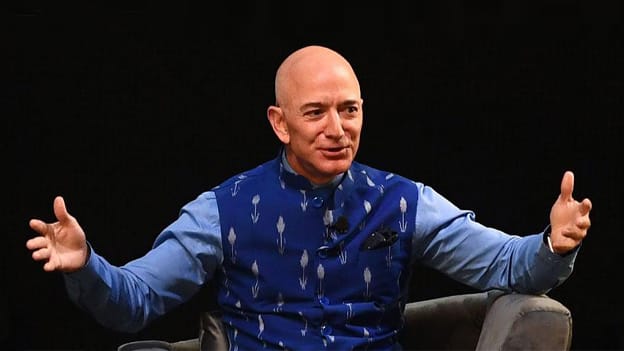One success, one winner can pay for dozens and dozens of failures: Jeff Bezos

During a fireside chat at the Amazon Smbhav in New Delhi this week, Amazon's CEO –and the world's richest man, Jeff Bezos was asked by Amazon India Head and Senior Vice President Amit Agarwal: "Did you think Amazon would be so successful?"
Bezos replied that he had no idea that Amazon would be such a success. He also called his company "the best place in the world to fail," adding that they have "lots of practices" in this respect.
Expanding on this idea, Bezos outlined the two kinds of failures in business. "Experimenting, trying to figure out something that's not been done and failing - that's a high-quality failure," he said, adding that he and Amit had failed together "many times" over the past two decades. According to Bezos, these "learning failures" are essential because "you're trying to figure out something new, maybe that nobody in the world has done before."
The second type outlined by Bezos was "operational excellence failures," - those embarrassing, wasteful let-downs that the Amazon CEO said we ought to avoid wherever possible. Bezos used the example of his company opening a new fulfillment center - a tried-and-tested operation his people know very - stating that "if we fail at that, it's just bad execution. That kind of failure should not be celebrated."
While he acknowledged these failures could also be learning experiences, they should be avoided at all costs and certainly not celebrated when they do occur. Rather, such occurrences are a time to be "self-critical."
"Nobody likes to fail," Bezos emphasized, "it's embarrassing. It doesn't feel good. We're all human. We had a good idea. We thought it was a good idea, and nobody came to the party. That happens."
Of course, there is a risk involved, and you never know for certain if your experiment will pay off. For that reason, Bezos says, organizations must "have a culture that supports failure."
There is also the issue of how leaders identify what type of failure they are embarking on before we begin a project. Many variables are within our control, but at a certain point, we have to take that risk and jump into the unknown uncertain if our experiment will pay off.
We tend to think of success and failure as opposing ideas -- the first we aspire to and the latter we are conditioned to avoid at all costs. We learn from our mistakes, though, and this leads me to wonder if success can even truly exist without an initial defeat (or two).
When it comes to failure, there are two types: learning and occupational. Should such endeavors be encouraged -- or even celebrated -- in the same way, we celebrate and encourage success and, if so, should we set aside a budget to allow for such failures to take place? After all, as Bezos says, "one success, one winner can pay for dozens and dozens of failures." It's crucial, therefore, that leaders allot their teams space and time to fail - that single, lucrative success is on the horizon, but cannot exist without failure.
Ultimately, Bezos was upbeat about his career trajectory: when asked where he would be if things hadn't worked out with Amazon, Bezos replied: "I would be an extremely happy software programmer somewhere." Perhaps, then, "failure" is also a case of mind over matter. It's not so much a question of avoiding it altogether, but is bouncing back, starting again, and using our losses to learn.
In your journey as a people leader, what are some of the "failures" that led you to success?
Image credit: Sakal Times













